Favorite Herbs
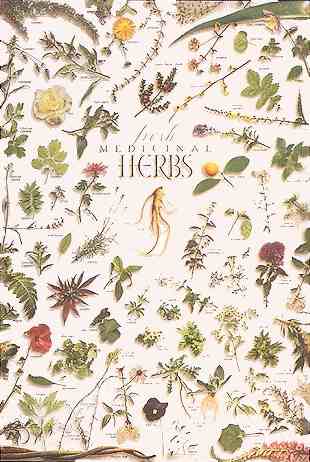 These are some of the herbs recommended most often by Electroherbalism. Every product below is considered a "safe supplement" in that no extractants, petrochemicals, or other toxic chemicals were used in processing them. See Toxins in Supplements for more information.
These are some of the herbs recommended most often by Electroherbalism. Every product below is considered a "safe supplement" in that no extractants, petrochemicals, or other toxic chemicals were used in processing them. See Toxins in Supplements for more information.
When using bulk herbs, grind whole or "cut and sift" ones to a powder, at least a coarse one, before use to increase effects. Serving sizes in the herb descriptions below are given in teaspoons of powder.
Most bulk herbs can be taken in tea form and this is often more effective, mainly since liquid is being consumed along with it. If using capsules or dry bulk herbs, always drink an adequate amount of water. Some people used to buy bulk powdered herbs and encapsulate them themselves, but since capsules are available so inexpensively these days, this is rarely done. Some people can take dry herb powders eaten directly, but since many herbs are bitter this is not often done, either. A fine art is to be able to toss a quarter to a half teaspoon of an herb powder to the back of the throat, bypassing the taste buds on the tongue, and wash it down with water and swallow before breathing in and choking on it. It is harder than it seems.
Bulk herbs can be bought at some health food stores or online and this is usually much cheaper, but capsules of most of the following herbs are also widely available. Herbalcom.com is one of the least expensive places to buy herbs online. Kalyx.com is one of the least expensive places to buy high quality herbs online. Kalyx's bulk herbs are from Frontier or Starwest and are vacuum packed. Herbalcom.com's 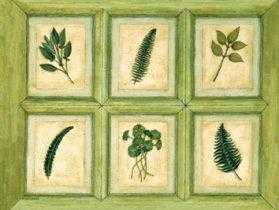 herbs are packed in thick plastic bags with a twist tie, and are of satisfactory quality, especially for the price, but not as good overall as Frontier herbs.
herbs are packed in thick plastic bags with a twist tie, and are of satisfactory quality, especially for the price, but not as good overall as Frontier herbs.
Most of the products recommended in the right side bar are from Nature's Way, who carries one of the most extensive lines of encapsulated herbs. Nature's Way herbs are among the best quality for the cost, as are those made by Neutraceutical Science Institute (NSI). Both of these are available at Vitacost, the online supplement vendor with the best pricing, service, and quality products. Nature's Herbs herb products are as good in quality as Nature's Way, but slightly more expensive. Now Foods has a good selection of encapsulated herbs, also at discount pricing. Likely the best quality line of encapsulated herbs without regard to pricing is from Eclectic Institute. These can be twice or more the cost of the other brands, but if one wants the best quality without regard to price, this is the line to consider.
Many of the herbs recommended are also available in liquid extracts, also considered toxin-free. The best brands for liquid herb extracts for quality and potency are, in general, Herb Pharm, Gaia, and Eclectic Institute.
Some herb descriptions below say they can be "simpled" Simpling is taking very large amounts of an herb, such as 10 capsules ata time, for acute problems. These herbs can typically also used as foods, such as slippery elm bark, which can be eaten by the tablespoonful, or are soothing to the stomach.
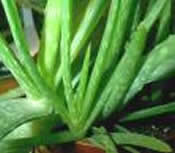 Aloe juice - Aloe is often recommended to stimulate elimination, but not by Electroherbalism. The components of aloe which are laxative can also cause cramping and nausea, and are not recommended. These types of products are typically sold in capsules, primarily since the components of aloe which cause this effect are very bitter. Most aloe juices have the bitter, laxative parts of the aloe removed although they do stimulate elimination a small amount, mostly be their all-over body cleansing effect, not as a laxative, George's Aloe Juice, made by Warren Laboratories, is one the best aloe juice products. It is fractionally distilled so removes the bitter components better than any other product of this type and tastes almost like water. Aloe juice is similar to astragalus in that it is used regularly to build deep immunity, combat allergies, and in its most popular role to heal intestinal and stomach disorders such as ulcers, colitis, diverticulitis, Crohn’s disease
Aloe juice - Aloe is often recommended to stimulate elimination, but not by Electroherbalism. The components of aloe which are laxative can also cause cramping and nausea, and are not recommended. These types of products are typically sold in capsules, primarily since the components of aloe which cause this effect are very bitter. Most aloe juices have the bitter, laxative parts of the aloe removed although they do stimulate elimination a small amount, mostly be their all-over body cleansing effect, not as a laxative, George's Aloe Juice, made by Warren Laboratories, is one the best aloe juice products. It is fractionally distilled so removes the bitter components better than any other product of this type and tastes almost like water. Aloe juice is similar to astragalus in that it is used regularly to build deep immunity, combat allergies, and in its most popular role to heal intestinal and stomach disorders such as ulcers, colitis, diverticulitis, Crohn’s disease 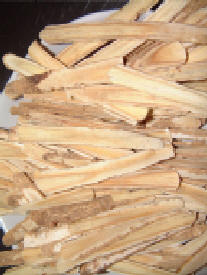 and irritable bowel, as well as fight acute problems like indigestion. It also has anti-inflammatory properties so is used for problems such as arthritis, and may be especially good for this use if it is being exacerbated by toxins in the liver or bowel. George's Aloe Juice can be simpled although this is not recommended for any aloe juice which contains acid preservatives or is not fractionally distilled.
and irritable bowel, as well as fight acute problems like indigestion. It also has anti-inflammatory properties so is used for problems such as arthritis, and may be especially good for this use if it is being exacerbated by toxins in the liver or bowel. George's Aloe Juice can be simpled although this is not recommended for any aloe juice which contains acid preservatives or is not fractionally distilled.
Astragalus root - Considered to stimulate immunity and cleansing at a deep level and although it is not considered a treatment for acute illness, is often used for influenza. It is more often recommended for chronic viral illness plus astragalus may help conventional antivirals work more effectively. Has the side benefit of calming the stomach, and it is used for general digestive disorders such as diarrhea, gas, and bloating. In China, it is used mostly for heart disease. Can be simpled.
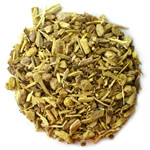 Barberry root bark - Liver cleanser and antiseptic, it provides berberine and other antiseptic compounds similar to goldenseal. Least bitter tasting of the berberine plants so can more easily be taken as tea. Usual dose - 1/4 to 1/2 tsp or 1 to 2 capsules two or three times per day can be doubled if needed, but laxative in large doses. From A Modern Herbal: ''A Modern Herbal'': ''The chief constituent of Barberry bark is Berberine, a yellow crystalline, bitter alkaloid, one of the few that occurs in plants belonging to several different natural orders. Medicinal Action and Uses: Tonic, purgative, antiseptic. It is used in the form of a liquid extract, given as decoction, infusion or tincture.
Barberry root bark - Liver cleanser and antiseptic, it provides berberine and other antiseptic compounds similar to goldenseal. Least bitter tasting of the berberine plants so can more easily be taken as tea. Usual dose - 1/4 to 1/2 tsp or 1 to 2 capsules two or three times per day can be doubled if needed, but laxative in large doses. From A Modern Herbal: ''A Modern Herbal'': ''The chief constituent of Barberry bark is Berberine, a yellow crystalline, bitter alkaloid, one of the few that occurs in plants belonging to several different natural orders. Medicinal Action and Uses: Tonic, purgative, antiseptic. It is used in the form of a liquid extract, given as decoction, infusion or tincture.
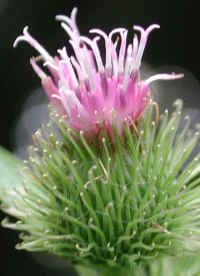 Burdock - Alterative (all-over cleanser, especially of the blood) also used for gentle stimulation of immune system to fight chronic infections, especially viral. However, it is more often used in skin disorders including eczema, psoriasis, and acne. Burdock is a principal ingredient of essiac tea. Calms stomach and relieves excess acid. Can be taken in very large doses if needed. Pleasant tasting and can be made into tea. The presence of high amounts of inulin and mucilage may explain burdock’s soothing effects on the skin and gastrointestinal tract. Inulin stimulates the growth of beneficial bacteria in the intestines, usually better than taking actual bacteria such as acidophilus. Bitter constituents in the root may also explain the traditional use of burdock to improve appetite and digestion. Usual dose 1/2 to 1 tsp or 2 to 4 capsules two or three times per day. Dose can be doubled, tripled, or simpled.
Burdock - Alterative (all-over cleanser, especially of the blood) also used for gentle stimulation of immune system to fight chronic infections, especially viral. However, it is more often used in skin disorders including eczema, psoriasis, and acne. Burdock is a principal ingredient of essiac tea. Calms stomach and relieves excess acid. Can be taken in very large doses if needed. Pleasant tasting and can be made into tea. The presence of high amounts of inulin and mucilage may explain burdock’s soothing effects on the skin and gastrointestinal tract. Inulin stimulates the growth of beneficial bacteria in the intestines, usually better than taking actual bacteria such as acidophilus. Bitter constituents in the root may also explain the traditional use of burdock to improve appetite and digestion. Usual dose 1/2 to 1 tsp or 2 to 4 capsules two or three times per day. Dose can be doubled, tripled, or simpled.
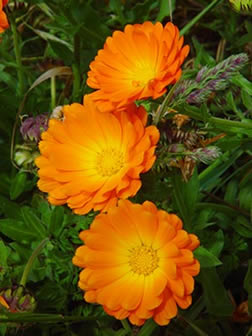 Calendula - Mostly used as a topical for the skin, but it excels at much more. It is one of the better antiseptic herbs when used internally to fight many types of pathogens. Provides nutrients for healing of the body and especially to the digestive tract. Not available from most herb brands, but Eclectic Institute does carry capsules. Nice aroma but can be bitter tasting. Calendula is also recognized for its anti-inflammatory properties. It is considered one of the most effective herbal remedies for skin problems, such as wounds, rashes, chapped hands, and infections. Calendula's triterpenes clearly demonstrate anti-inflammatory actions, making it useful internally for arthritic problems. Calendula's anti-inflammatory, astringent, and antiseptic (antibacterial and antiviral) properties have been confirmed by modern laboratory and animal studies. Some studies indicate an immune-stimulating action as well. The benefits of calendula in healing burns and wounds have also been demonstrated in research studies. Usual dose of loose powder (made into tea) - 1/2 - 1 tsp taken two or more times per day. Make a double or triple strength tea to use as a topical as desired.
Calendula - Mostly used as a topical for the skin, but it excels at much more. It is one of the better antiseptic herbs when used internally to fight many types of pathogens. Provides nutrients for healing of the body and especially to the digestive tract. Not available from most herb brands, but Eclectic Institute does carry capsules. Nice aroma but can be bitter tasting. Calendula is also recognized for its anti-inflammatory properties. It is considered one of the most effective herbal remedies for skin problems, such as wounds, rashes, chapped hands, and infections. Calendula's triterpenes clearly demonstrate anti-inflammatory actions, making it useful internally for arthritic problems. Calendula's anti-inflammatory, astringent, and antiseptic (antibacterial and antiviral) properties have been confirmed by modern laboratory and animal studies. Some studies indicate an immune-stimulating action as well. The benefits of calendula in healing burns and wounds have also been demonstrated in research studies. Usual dose of loose powder (made into tea) - 1/2 - 1 tsp taken two or more times per day. Make a double or triple strength tea to use as a topical as desired.
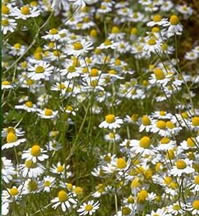 Chamomile (German) - Most often used as calming tea, but has good effects, including healing and as a premier antispasmodic, on the digestive tract. Usually reduces allergy symptoms. Weak tea can be used for babies for colic, cramping, gas, and other digestive problems. Good topical for wounds. Can be added to tea blends to improve the flavor and aroma. The 1997 Commission E on Phytotherapy and Herbal Substances of the German Federal Institute for Drugs recommends Chamomile for (external) Skin and mucous membrane inflammations, as well as bacterial skin diseases, including those of the oral cavity and gums. Inflammations and irritations of the respiratory tract (inhalation). Ano-genital inflammation (baths and irrigation). Internal: Gastrointestinal spasms and inflammatory diseases of the gastrointestinal tract. Chamomile contains numerous volatile oils and flavonoids which contribute to the herb's anti- antispasmodic, anti-inflammatory, antiseptic, and muscle relaxing action, especially in the gastrointestinal tract. Usual dose of loose powder (made into tea) - 1/2 - 1 tsp taken two or more times per day.
Chamomile (German) - Most often used as calming tea, but has good effects, including healing and as a premier antispasmodic, on the digestive tract. Usually reduces allergy symptoms. Weak tea can be used for babies for colic, cramping, gas, and other digestive problems. Good topical for wounds. Can be added to tea blends to improve the flavor and aroma. The 1997 Commission E on Phytotherapy and Herbal Substances of the German Federal Institute for Drugs recommends Chamomile for (external) Skin and mucous membrane inflammations, as well as bacterial skin diseases, including those of the oral cavity and gums. Inflammations and irritations of the respiratory tract (inhalation). Ano-genital inflammation (baths and irrigation). Internal: Gastrointestinal spasms and inflammatory diseases of the gastrointestinal tract. Chamomile contains numerous volatile oils and flavonoids which contribute to the herb's anti- antispasmodic, anti-inflammatory, antiseptic, and muscle relaxing action, especially in the gastrointestinal tract. Usual dose of loose powder (made into tea) - 1/2 - 1 tsp taken two or more times per day.
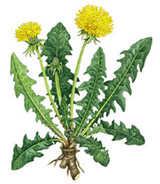 Dandelion - Root provides mild but effective cleansing of the liver as well as the kidneys and bladder. When used in sufficient amount, is an excellent diuretic and safe since it contains a good deal of potassium. Leaf is less often used. It has stronger action on the kidneys and less on the liver, but is an even better source of nutrients. Be sure to drink plenty of water when using either part. A good way to use it to make a large amount of weak tea and drink throughout the day instead of water. The principal constituents responsible for dandelion’s action on the digestive system and liver are sesquiterpene lactones that are unique to dandelion. Studies show dandelion to be a powerful diuretic. Dandelion's bitter compounds increase the gallbladder's production of bile. This improves liver function and the body's metabolism of fats. This, in turn, has the effect of stimulating digestion and appetite. Dandelion also acts as a mild laxative. Usual dose of root - 1/2 - 1 tsp (or 2 to 4 capsules) taken two or three times per day but can be taken in much larger amounts.
Dandelion - Root provides mild but effective cleansing of the liver as well as the kidneys and bladder. When used in sufficient amount, is an excellent diuretic and safe since it contains a good deal of potassium. Leaf is less often used. It has stronger action on the kidneys and less on the liver, but is an even better source of nutrients. Be sure to drink plenty of water when using either part. A good way to use it to make a large amount of weak tea and drink throughout the day instead of water. The principal constituents responsible for dandelion’s action on the digestive system and liver are sesquiterpene lactones that are unique to dandelion. Studies show dandelion to be a powerful diuretic. Dandelion's bitter compounds increase the gallbladder's production of bile. This improves liver function and the body's metabolism of fats. This, in turn, has the effect of stimulating digestion and appetite. Dandelion also acts as a mild laxative. Usual dose of root - 1/2 - 1 tsp (or 2 to 4 capsules) taken two or three times per day but can be taken in much larger amounts.
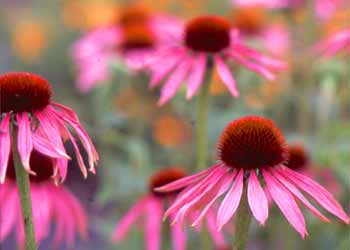 Echinacea - Premier immune stimulant and one of the most widely used herbs. Recommended for most bacterial and viral infections, acute and chronic. The two most common products available are echinacea purpurea aerial parts and echinacea angustofolia root. Purpurea may be better for fighting acute illness more quickly, but angustofolia root seems to better stimulate the immune system and clear lymphs nodes. Best method may be to use equal amounts of the two, and there are some commonly available supplements which provide this. The most common error is using too small a dose to be effective. An effective dose of echinacea root recommended by Michael Murray is 1-2g taken 3 times per day, assuming good quality with a typical profile of active ingredients. Not widely used for it, but good to heal the intestinal tract and is an excellent cleanser, especially of the lymphs. Stops enzymes from venom, bacteria, and viruses from destroying cells and tissue. When used for a cold, can start with a large dose at the onset (3g or more taken over a couple of hours) to stop virus from damaging cells. For a venomous snake or spider bite, VERY large doses (like 20g or more) should be used and as soon as possible (use in conjunction with very high dose vitamin C and, of course, also seek professional medical help). Echinacea is usually a good antiinflammatory in cases of plain infection, but in chronic disorders caused or exacerbated by toxins it may actually cause inflammation, especially in blood type O's, and should be avoided. Usual dose - 1/2 to 1 tsp or 2 to 4 capsules taken two or three times per day may be doubled as needed.
Echinacea - Premier immune stimulant and one of the most widely used herbs. Recommended for most bacterial and viral infections, acute and chronic. The two most common products available are echinacea purpurea aerial parts and echinacea angustofolia root. Purpurea may be better for fighting acute illness more quickly, but angustofolia root seems to better stimulate the immune system and clear lymphs nodes. Best method may be to use equal amounts of the two, and there are some commonly available supplements which provide this. The most common error is using too small a dose to be effective. An effective dose of echinacea root recommended by Michael Murray is 1-2g taken 3 times per day, assuming good quality with a typical profile of active ingredients. Not widely used for it, but good to heal the intestinal tract and is an excellent cleanser, especially of the lymphs. Stops enzymes from venom, bacteria, and viruses from destroying cells and tissue. When used for a cold, can start with a large dose at the onset (3g or more taken over a couple of hours) to stop virus from damaging cells. For a venomous snake or spider bite, VERY large doses (like 20g or more) should be used and as soon as possible (use in conjunction with very high dose vitamin C and, of course, also seek professional medical help). Echinacea is usually a good antiinflammatory in cases of plain infection, but in chronic disorders caused or exacerbated by toxins it may actually cause inflammation, especially in blood type O's, and should be avoided. Usual dose - 1/2 to 1 tsp or 2 to 4 capsules taken two or three times per day may be doubled as needed.
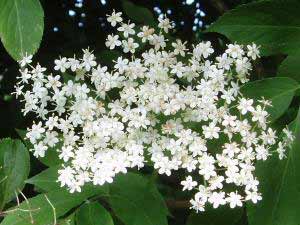 Elderflower - Good antiseptic against viruses and as an antiinflammatory, fair against fungi, and a competent blood cleanser by assisting removal of cellular waste products, elderflower is mostly used for colds, cough, and flu plus arthritis and allergies. Larger amounts can stimulate sweating, and this property is welcomed in some conditions. From King's 1898 Dispensatory:
"In warm infusion, elder flowers are diaphoretic and gently stimulant; in cold infusion, they are diuretic, alterative, and cooling, and may be used in all diseases requiring such action, as in hepatic derangements of children, erysipelas, erysipelatous diseases, etc. In infusion, with maidenhair and beech-drops, they will be found very valuable in all erysipelatous [febrile skin inflammation] diseases." Usual dose - 1/2 to 1 tsp loose powder or 2 to 4 capsules two or three times per day can be doubled if needed. Elderberries are much more widely used than the flowers, but less effective for most complaints. Although it is pleasant tasting and suitable for children who cannot swallow capsules, a lot of elderberry extract is necessary for an effective remedy for most viral complaints for which they are most used, and therefore not very cost effective like the flowers.
Elderflower - Good antiseptic against viruses and as an antiinflammatory, fair against fungi, and a competent blood cleanser by assisting removal of cellular waste products, elderflower is mostly used for colds, cough, and flu plus arthritis and allergies. Larger amounts can stimulate sweating, and this property is welcomed in some conditions. From King's 1898 Dispensatory:
"In warm infusion, elder flowers are diaphoretic and gently stimulant; in cold infusion, they are diuretic, alterative, and cooling, and may be used in all diseases requiring such action, as in hepatic derangements of children, erysipelas, erysipelatous diseases, etc. In infusion, with maidenhair and beech-drops, they will be found very valuable in all erysipelatous [febrile skin inflammation] diseases." Usual dose - 1/2 to 1 tsp loose powder or 2 to 4 capsules two or three times per day can be doubled if needed. Elderberries are much more widely used than the flowers, but less effective for most complaints. Although it is pleasant tasting and suitable for children who cannot swallow capsules, a lot of elderberry extract is necessary for an effective remedy for most viral complaints for which they are most used, and therefore not very cost effective like the flowers.
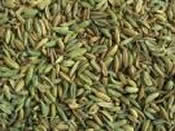 Fennel Seeds - One of the best herbs to fight gas, cramps, acid indigestion, and many other digestive tract maladies, chronic or acute. Used with turmeric, often provides quick and effective relief from many digestive disorders, even some chronic serious ones. Seeds taste like licorice when chewed. Rich in minerals including magnesium. Mild liver and urinary tract stimulant. Capsules of powder should be used for inflammatory digestive disorders like Crohn's or IBS in whatever amount is necessary to stop cramping and discomfort. Usual dose - 1/2 - 1 tsp seeds (chew well, or make into tea eating the soaked seeds) or two to four capsules two or three times per day. Can be used in very large amounts as needed. Weak, strained tea (remove the seeds) can be used for babies for colic, cramping, gas, and other digestive problems and as a mild antiparasitic and liver cleanser. Can be simpled.
Fennel Seeds - One of the best herbs to fight gas, cramps, acid indigestion, and many other digestive tract maladies, chronic or acute. Used with turmeric, often provides quick and effective relief from many digestive disorders, even some chronic serious ones. Seeds taste like licorice when chewed. Rich in minerals including magnesium. Mild liver and urinary tract stimulant. Capsules of powder should be used for inflammatory digestive disorders like Crohn's or IBS in whatever amount is necessary to stop cramping and discomfort. Usual dose - 1/2 - 1 tsp seeds (chew well, or make into tea eating the soaked seeds) or two to four capsules two or three times per day. Can be used in very large amounts as needed. Weak, strained tea (remove the seeds) can be used for babies for colic, cramping, gas, and other digestive problems and as a mild antiparasitic and liver cleanser. Can be simpled.
Ginger Root - Ginger root is one of the most popular herbs in the world and for good reason. It has a wide variety of uses, it is very inexpensive, and it is easy to grow oneself. Ginger is most widely used for conditions such as an upset stomach, especially gas, cramping, and nausea. For these purposes it is unparalleled, usually being more effective than prescription and over-the-counter drugs for these purposes. For other stomach  complaints it also excels since it does have some mild antibacterial properties which can address the cause of some mild problems. NOTE, however, it is NOT usually good to use for acid indigestion since it is a spicy herb and can exacerbate the condition. Ginger is most often used in capsule form since it is hot tasting, although ginger root crystalized with sugar is commonly available and the sweetness takes the edge off the spiciness. Besides stomach and intestinal complaints ginger is also useful as a mild anti-inflammatory and can be helpful for painful conditions such as arthritis. Another good use for ginger is to "potentize" other supplements, making them more available to the body, as well as help prevent the ill effects of supplements that can upset the stomach and cause cramping, such as zinc or iron supplements. In this reviewer's point of view, it should be added to supplements instead of bioperine, a pepper extract added to many supplements as a potentizer, but which can cause acid indigestion in even tiny amounts.
complaints it also excels since it does have some mild antibacterial properties which can address the cause of some mild problems. NOTE, however, it is NOT usually good to use for acid indigestion since it is a spicy herb and can exacerbate the condition. Ginger is most often used in capsule form since it is hot tasting, although ginger root crystalized with sugar is commonly available and the sweetness takes the edge off the spiciness. Besides stomach and intestinal complaints ginger is also useful as a mild anti-inflammatory and can be helpful for painful conditions such as arthritis. Another good use for ginger is to "potentize" other supplements, making them more available to the body, as well as help prevent the ill effects of supplements that can upset the stomach and cause cramping, such as zinc or iron supplements. In this reviewer's point of view, it should be added to supplements instead of bioperine, a pepper extract added to many supplements as a potentizer, but which can cause acid indigestion in even tiny amounts.
 Ginseng (Korean, Panax, or American) - The most common use of ginseng is to increase energy levels. It can be too stimulating for younger people, but usually does well for older people as well as those weak from illness. Ginseng gently raises nitric oxide production potential in the blood when used long term, so can be helpful for male libido problems. Increases resistance to cold weather as well as mental and physical fatigue. Six year or older roots should be used since there are less active ingredients in young roots. Must be taken for months to gain full benefit, but a good quality root should have noticeable effects within a week. Some of the alcoholic extract products sold in small bottles are excellent. Look for the highest potency ones (2g or greater). Some say it should not be taken when there is high blood pressure but others say it is an excellent regulator of the heart. Korean (panax) and American ginseng both have the same active ingredient, ginsenosides. Usual dosage - 1/2 to 1 tsp, 2 to 4 capsules, or one small bottle of extract taken once or twice per day.
Ginseng (Korean, Panax, or American) - The most common use of ginseng is to increase energy levels. It can be too stimulating for younger people, but usually does well for older people as well as those weak from illness. Ginseng gently raises nitric oxide production potential in the blood when used long term, so can be helpful for male libido problems. Increases resistance to cold weather as well as mental and physical fatigue. Six year or older roots should be used since there are less active ingredients in young roots. Must be taken for months to gain full benefit, but a good quality root should have noticeable effects within a week. Some of the alcoholic extract products sold in small bottles are excellent. Look for the highest potency ones (2g or greater). Some say it should not be taken when there is high blood pressure but others say it is an excellent regulator of the heart. Korean (panax) and American ginseng both have the same active ingredient, ginsenosides. Usual dosage - 1/2 to 1 tsp, 2 to 4 capsules, or one small bottle of extract taken once or twice per day.
 Kelp - Sea vegetable which provides a large amount of trace and other minerals, especially iodine. Helpful for increasing thyroid function and fighting disorders such as uterine and breast fibroids. Often used for weight loss. Somewhat antiparasitic and antibacterial. Ascophyllum nodosum is known as Norwegian kelp or Knotted Kelp and grows only in deep ocean waters so is one of the most popular types for supplements. Kelp is a critical supplement to keep around the house. It can be used once or twice per week for general maintenance to provide trace minerals and iodine, but should also be kept on hand for emergencies since it prevents damage from radioactive materials by binding to sites in the thyroid most affected by radiation. Usual dosage - 1 to 2 capsules twice per day can be doubled short term if needed.
Kelp - Sea vegetable which provides a large amount of trace and other minerals, especially iodine. Helpful for increasing thyroid function and fighting disorders such as uterine and breast fibroids. Often used for weight loss. Somewhat antiparasitic and antibacterial. Ascophyllum nodosum is known as Norwegian kelp or Knotted Kelp and grows only in deep ocean waters so is one of the most popular types for supplements. Kelp is a critical supplement to keep around the house. It can be used once or twice per week for general maintenance to provide trace minerals and iodine, but should also be kept on hand for emergencies since it prevents damage from radioactive materials by binding to sites in the thyroid most affected by radiation. Usual dosage - 1 to 2 capsules twice per day can be doubled short term if needed.
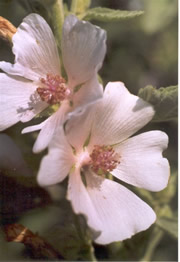 Marshmallow - Marshmallow root is an excellent stomach and intestinal mucilage and a gentle diuretic which helps against pain in the urinary tract, although it is most widely used for cough and sore throat remedies due to its soothing qualities. It is a primary ingredient in a product often recommended for kidney and liver problems - Planetary Herbal's Stone Free. The plant's name comes from its favorite habitat - marshes and other damp environments. The scientific name is althea officinalis and one will often see it called this on supplement packages instead of its common name, perhaps so people don't think that the fluffy confection of the same name is included in the supplement. Can be simpled.
Marshmallow - Marshmallow root is an excellent stomach and intestinal mucilage and a gentle diuretic which helps against pain in the urinary tract, although it is most widely used for cough and sore throat remedies due to its soothing qualities. It is a primary ingredient in a product often recommended for kidney and liver problems - Planetary Herbal's Stone Free. The plant's name comes from its favorite habitat - marshes and other damp environments. The scientific name is althea officinalis and one will often see it called this on supplement packages instead of its common name, perhaps so people don't think that the fluffy confection of the same name is included in the supplement. Can be simpled.
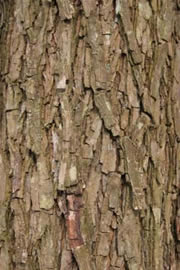 Slippery elm bark - One of the best intestinal healing herbs and mildly stimulates elimination when taken in sufficient dose. Has good action for many chronic and most acute intestinal disorders. It is mildly antiparasitic and antibacterial and also supports lung function. Can be used as a food if nothing else will stay down since it is so calming on the stomach and although starchy, it is nutritious, so can be life-saving in some cases. Absorbs a great deal of water and should be fully hydrated before eating the bulk powder, or plenty of water taken with capsules. Usual dose - 1 to 2 or more tablespoons (yes, tablespoons) of powder mixed in oatmeal, or by itself into a gruel with hot water, mixing a little honey and cinnamon if desired, and adding crushed fennel seeds or powder for more action if needed. Taking large quantities like this is most effective, but it also beneficial in smaller doses, like 1 teaspoon or 2 to 4 capsules or more taken two or more times per day. Can be simpled.
Slippery elm bark - One of the best intestinal healing herbs and mildly stimulates elimination when taken in sufficient dose. Has good action for many chronic and most acute intestinal disorders. It is mildly antiparasitic and antibacterial and also supports lung function. Can be used as a food if nothing else will stay down since it is so calming on the stomach and although starchy, it is nutritious, so can be life-saving in some cases. Absorbs a great deal of water and should be fully hydrated before eating the bulk powder, or plenty of water taken with capsules. Usual dose - 1 to 2 or more tablespoons (yes, tablespoons) of powder mixed in oatmeal, or by itself into a gruel with hot water, mixing a little honey and cinnamon if desired, and adding crushed fennel seeds or powder for more action if needed. Taking large quantities like this is most effective, but it also beneficial in smaller doses, like 1 teaspoon or 2 to 4 capsules or more taken two or more times per day. Can be simpled.
 Suma - Also known as Brazilian ginseng since it is known to increase energy levels plus its usually a much better value than ginseng. Good antiparasitic when used long term. Astringent to the digestive tract and usually good for chronic diarrhea. Somewhat vanilla flavored but mostly bitter in large amounts, it is nevertheless used as a food in native areas where it is cultivated. Too much at one time can cause cramping, though, so stick to recommended dose or less if this is a problem. Suma is used in Brazil as a general tonic, a rejuvenant for convalescents and an aphrodisiac. Russian Olympic athletes claim that Suma is a muscle and endurance builder without the negative side effects of steroids. Much of Suma's chemistry is unique - it appears to enhance the body's use of oxygen on the cellular level. Suma's saponins have been clinically demonstrated to inhibit cancer cell growth and to help regulate blood sugar levels. Two Japanese patents for Suma pfaffosides and pfaffic acid derivatives as antitumor agents have been granted. A 1995 U.S. Patent application demonstrated increased hemoglobin levels during sickle cell treatment. Numerous other Suma-based patents have been filed in both France, Japan, Russia and the USA relating to Suma's anti-tumor, anti-inflammatory, and aphrodisiac effects. Usual dose - 1/2 tsp bulk powder or two capsules two or three times per day.
Suma - Also known as Brazilian ginseng since it is known to increase energy levels plus its usually a much better value than ginseng. Good antiparasitic when used long term. Astringent to the digestive tract and usually good for chronic diarrhea. Somewhat vanilla flavored but mostly bitter in large amounts, it is nevertheless used as a food in native areas where it is cultivated. Too much at one time can cause cramping, though, so stick to recommended dose or less if this is a problem. Suma is used in Brazil as a general tonic, a rejuvenant for convalescents and an aphrodisiac. Russian Olympic athletes claim that Suma is a muscle and endurance builder without the negative side effects of steroids. Much of Suma's chemistry is unique - it appears to enhance the body's use of oxygen on the cellular level. Suma's saponins have been clinically demonstrated to inhibit cancer cell growth and to help regulate blood sugar levels. Two Japanese patents for Suma pfaffosides and pfaffic acid derivatives as antitumor agents have been granted. A 1995 U.S. Patent application demonstrated increased hemoglobin levels during sickle cell treatment. Numerous other Suma-based patents have been filed in both France, Japan, Russia and the USA relating to Suma's anti-tumor, anti-inflammatory, and aphrodisiac effects. Usual dose - 1/2 tsp bulk powder or two capsules two or three times per day.
 Turmeric - Turmeric extract is called curcumin. Turmeric is often recommended to fight pathogenic intestinal bacteria and improve flora. One of the best herbal antioxidants, even in non-extracted form. Stimulates bile flow and helps clean the liver and gallbladder and may provide some action against urinary tract bacteria. Often provides quick and effective relief from many digestive disorders, even some chronic serious ones, especially when used with fennel seeds. Curcumin excels as an antiinflammatory for sore muscles and joints, and also has strong antioxidant action throughout the body. One of the best COX-2 inhibitors, bar none, and with the added benefit of cleaning the liver instead of hampering its function as many prescription drugs do. This may be very helpful when fighting inflammatory disorders including cancer. Also, provides pain relief from arthritis and other joint and muscle disorders while providing antioxidants for repair, instead of masking symptoms causing damage to be accelerated. Curcumin does not appear to have as much effect as plain turmeric against pathogens, though. Too much of this spicy herb at one time can cause burning in the stomach, which can be relieved by using with fennel seeds. Usually not recommended in cases of gallstones, but often included with other herbs in formulas which are made for this purpose, including Planetary Formula's Stone Free. Usual dose of turmeric powder
Turmeric - Turmeric extract is called curcumin. Turmeric is often recommended to fight pathogenic intestinal bacteria and improve flora. One of the best herbal antioxidants, even in non-extracted form. Stimulates bile flow and helps clean the liver and gallbladder and may provide some action against urinary tract bacteria. Often provides quick and effective relief from many digestive disorders, even some chronic serious ones, especially when used with fennel seeds. Curcumin excels as an antiinflammatory for sore muscles and joints, and also has strong antioxidant action throughout the body. One of the best COX-2 inhibitors, bar none, and with the added benefit of cleaning the liver instead of hampering its function as many prescription drugs do. This may be very helpful when fighting inflammatory disorders including cancer. Also, provides pain relief from arthritis and other joint and muscle disorders while providing antioxidants for repair, instead of masking symptoms causing damage to be accelerated. Curcumin does not appear to have as much effect as plain turmeric against pathogens, though. Too much of this spicy herb at one time can cause burning in the stomach, which can be relieved by using with fennel seeds. Usually not recommended in cases of gallstones, but often included with other herbs in formulas which are made for this purpose, including Planetary Formula's Stone Free. Usual dose of turmeric powder 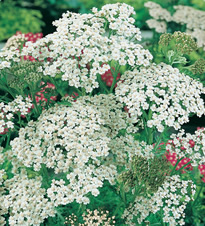 - 1/4 to 1/2 tsp bulk powder or one to two capsules two or three times per day. Curcumin comes in capsules and dosage can usually be doubled if needed short term.
- 1/4 to 1/2 tsp bulk powder or one to two capsules two or three times per day. Curcumin comes in capsules and dosage can usually be doubled if needed short term.
Yarrow flowers - Yarrow has excellent antibacterial, antiinflammatory, and antiallergenic properties, and is a good antiviral, astringent, and antiparasitic to boot. It is often taken for colds and flu, but is just as useful or more so in many chronic disorders. Lowers blood pressure, improves circulation, and stops excessive bleeding, internal or external. Effective for weak digestion with its bitter properties, but its bitterness makes it hard to take as a single tea on a regular basis. One of the single best herbs to take to fight many infectious disorders. Too much at one time can cause cramps, so decrease dose if this occurs, or take with ginger to mitigate this effect. Usual dose is 1/4 to 1/2 tsp or 1 to 2 capsules taken two or three times per day. Start with the smaller amount (1 capsule or 1/4 tsp).
Links Botanical.com, A Modern Herbal is one of the most comprehensive online lists of herbs and gives descriptions, uses, and plate graphics for most of them. Alt Nature - Has photographs of herbs, perhaps useful to the wildcrafter, plus careful recommendations on their medicinal use. Michael Moore is founder of the Southwest School of Botanical Medicine and has a web page with an excellent collection of herb pictures, drawings, and lithographs, and texts on early eclectic herbalists. Henriette's Herbal Homepage - Henriette is the keeper of the Culinary and Medicinal FAQs for the alt.folklore.herbs newsgroup and also features classic herb texts and an extensive database of pictures. Howie Brounstein is an herbalist amnd wildcrafter who once sold a number of interesting herbs. He is now a teacher at the Columbines School of Botanical Studies. . |
 |